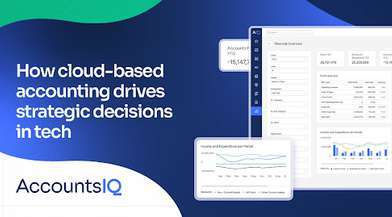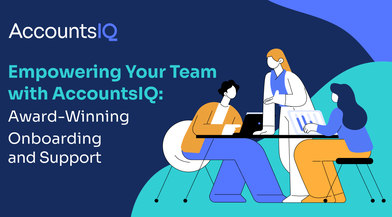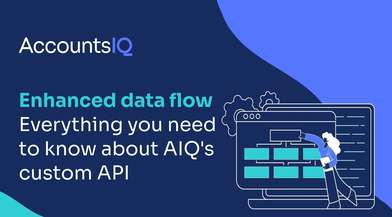
Integrated accounting allows you to bring together your business systems so that they work together to improve the flow of information and reduce your operational costs. The benefits of an integrated accounting system can add up to a radical transformation of your finance function. In this article we explore the advantages of integrated accounting systems and when integrating may be the right choice for your business.
Features of an integrated accounting system
Integrated accounting allows you to connect all of your business systems so that they work together seamlessly. In the past, businesses used separate tools for separate purposes… accounting, invoicing, sales, customer management, and so on. Managing all of these different data streams and ensuring consistency across reports was resource-intensive, often inaccurate, and frustrating.
Cloud-based accounting platforms like AccountsIQ have changed all that. Our Open API allows us to easily integrate with other Cloud-based apps. Integration means you can automatically populate your accounting system and others, effortlessly and accurately.
Here’s a few examples of the types of systems we can integrate with:
- Electronic banking systems. Save time with automated bank reconciliation, and gain insight into cashflow and payment planning.
- Optical character recognition (OCR) technology like Kefron, Lightyear and AutoEntry. Automate document and invoice capture and eliminate the need for manual data entry.
- CRM Systems like Salesforce. Link sales to finance, with everything in the customer pipeline from billing details and key contacts to invoicing and contracts. The integration goes both ways, giving both the sales and finance teams a consistent view of the data – a single source of truth.
- Sales systems like EPOS and POS. AccountsIQ syncs directly with the source data. Gain better visibility of weekly and monthly gross margins and profitability across the business and for individual branches and locations.
- Billing systems like Fusebill to automate subscription billing, streamlining your billing workflow, saving time and improving agility.
- Payroll systems like BrightPay that help save a lot of time on payroll administration.
- Credit control systems like Chaser to automate invoice chasing and streamline the accounts receivable process.
- FX Payment Services like TransferMate. Benefit from seamless international payments: all FX processing can be done as part of a payment run directly from AccountsIQ at preferential exchange rates.
- Business intelligence reporting like Power BI. To complement our own suite of reports and dashboards, AccountsIQ also connects to Power BI through an OData connector, which enables users to adapt layouts to their own reporting needs and graphically represent any analysis they want to do in AccountsIQ, in real time in Power BI.
- Any system with an Open API. The API means integration possibilities are endless. If you have an in-house system built on an Open API, we can connect to it.
When should you consider accounting system integration?
Integrated accounting is ideal for businesses who stand to save a significant amount of time and costs otherwise spent on manual tasks and data entry. If you’re only dealing with a handful of transactions per month and it only takes 10 minutes to download and upload them manually, then it may not be worth the effort to integrate. But if you’re dealing with thousands of transactions, issues such as data integrity, data processing, and manual entry can take a lot of time and cause a lot of headaches. So, ask yourself…
- Why do you want to integrate your systems? Are you doing duplicate work? Do you have a lot of data that makes manual input unfeasible? Are there mistakes in your data?
- What do you want to integrate? There are plenty of possibilities here, consider whether the integration really relates to the finance function. Will integrating allow you to maximise the value delivered by each integration?
What’s involved in accounting system integration?
We have a growing network of integration partners which makes it quick and easy for customers wanting to integrate software applications that we already support. Where an integration is required with a new platform, extra work is needed to define the data fields that need to be mapped to the accounting system. Some of our customers seek our help with integrations, others do it themselves or hire a third party.
Using AccountsIQ’s API integration means integrating with another cloud system is relatively straightforward. We provide a full set of documentation on the functions available and connect client’s IT teams with our developers who will help with any questions. We can then provide access to a staging environment where test integrations can be tried out.
Integrations are frequently requested and we’re very happy to talk through the options and assist with those appointed to carry out the work.
Timing If you’re going live with a new accounting system, it may be tempting to set up the integration at the same time. However, we recommend waiting until the new system is well bedded into your finance team. Any integration is only as good as the foundation that it is built upon. If your accounting software isn’t running smoothly, then a new integration can potentially add further problems. It is best to get the base accounting system up and running, the finance team trained, and any adjustments ironed out before starting an integration. Portswigger are a recent client who came on board AccountsIQ because of the integration capability with their in house CRM and OCR technology software, AutoEntry.
The integration and the API are what we’ve really been happy with. We have developers in house who roll their eyes when you talk about the other larger accounting software vendors because they are so cumbersome. Our team found it really easy working with AccountsIQ to get it all up and running. That’s what really sold us.” – Helen Macdonald, Finance Manager, PortSwigger
Advantages of integrated accounting systems
Integrated accounting has grown in popularity alongside the boom in cloud-based accounting. This movement was accelerated by the Covid-19 pandemic which forced businesses to move away from outdated processes and embrace efficiency. Now, most of our customers don’t see integration as an optional add-on, but rather a requirement and essential part of their finance function. We now have a long list of software integration partners, and are constantly adding new ones. Better still, every time we create an integration development partner for one of our customers, that integration becomes available for everyone. Now, even for customers like charities and schools with very specific reporting needs, we can quickly deploy integrated solutions to meet those needs and realise the advantages of integrated accounting systems. These advantages include…
Maintain data integrity through your inputs and outputs
When quality data goes into your accounting system, you get quality data out of it. Integrated accounting makes it possible to automate all of the input and ensure that the data across all of your systems are consistent. This level of accuracy brings an extra layer of assurance to your reporting, the so-called ‘One Version of the Truth’.
Scalability through automation
Cloud-based automations provided by AccountsIQ and our integration partners make it possible for businesses to scale quickly, which is one of the reasons why many fast-growing companies use AccountsIQ. For example, connectivity provider, Asavie, switched to AccountsIQ when it began working in multiple currencies. AccountsIQ integrates with Concur, Asavie’s preferred tool for automated expense management, providing better business intelligence software and a more streamlined process, both crucial to supporting their growth.
AccountsIQ solves so many problems for businesses like ours; it can be configured to tackle quite complex accounting issues but without the overheads and ongoing costs associated with some of the vendors at the higher end of the market.”
Emma Whelan, Financial Controller, Asavie
Free up time for value added tasks
Cloud accounting and integrated systems are dramatically changing the way accountants work for the benefit of both the business and their own pleasure in the task at hand. Previously, accounting functions such as VAT returns and bank reconciliation were laborious and time intensive. Now, computers can do most of the manual work and accountants can be better utilised. Rather than mundane tasks like admin and data entry, accountants can now focus on reporting, trends and advisory work.
With the iCompleat integration approved invoices get pushed straight through to AccountsIQ with the PDF attached. It’s incredibly useful being able to go into your accounting system and pull up an invoice whenever you need to, say when you’re doing an audit, or for month end processes when you want to review an invoice. The iCompleat integration adds extra control to the business and a clear audit trail. There’s now a lot more eyes on the process. And no surprises at month end.” Joanna McGovern, Finance Director, Chopstix
Reduce costs and eliminate bottlenecks
Of course, the added benefit of these time-saving automations is a reduction in operational costs otherwise spent on manual tasks. Even better, that time saved can be spent on making the business more profitable, and because of the inherent scalability of AccountsIQ, you can maintain your finance department without having to hire extra manpower to get the job done.
An accounting solution that’s constantly evolving
We’ve recognised a huge demand from our customers in accounts payable and purchase ledger automation software. We already integrate with related AP tools such as Kefron, Lightyear and AutoEntry, but are currently in the process of creating this core functionality within AccountsIQ. This new feature will allow finance teams to send attachments such as invoices to a nominated Inbox which will be automatically processed by AccountsIQ. We anticipate that our customers will be able to get 90% of the purchase ledger done through this process. We’re constantly evolving AccountsIQ with new features and new integrations to make sure our customers have an accounting solution that’s as seamless and efficient as possible.
Further details about APIs and why should accountants care and integrated accounting software.
Book a demo to see how AccountsIQ can automate many of the day-to-day finance processes, help you collaborate easier with the wider business and accelerate your finance function.


